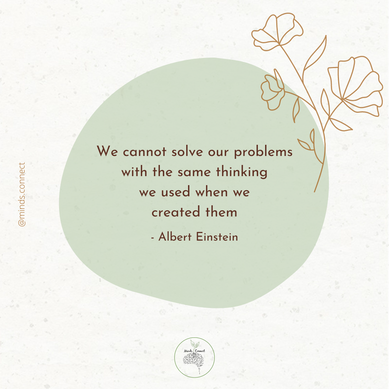They, in turn, influence your emotions and your behaviour. They are also connected to the beliefs you have about yourself, the world, and others. These maladaptive thought patterns are usually automatic and can be difficult to identify if we aren’t aware of them.
We all experience cognitive distortions to some degree. However, people that have experienced trauma tend to have more maladaptive appraisals of self, others, and the world. They tend to experience more emotional discomfort because of those cognitive distortions. Threatening appraisals related to the trauma and its aftermath may be developed in those experiencing PTSD, such as the overgeneralisation of danger (‘bad things always happen to me’) or judgements of their own actions (‘I should have coped better’). Based on Dr. Aaron Beck's work, Dr. Burns* has identified 10 common cognitive distortions that can contribute to uncomfortable emotions. These are: 1. All-or-Nothing Thinking You see things in black-or-white categories. If a situation falls short of perfect, you see it as a total failure. Example: When a student makes a mistake in the exam, he thinks “I’ve blown my exam completely.” 2. Overgeneralization Drawing a faulty conclusion about something based on one experience. You see a single negative event, such as a romantic rejection or a career reversal, as a never-ending pattern of defeat by using words such as “always” or “never” when you think about it. Example: you get rejected on a job interview and you conclude that you will never be able to find a job. 3. Mental Filter You pick out a single negative detail and dwell on it exclusively, so that your vision of all reality becomes negative. You focus only on the negative aspects and dysqualify all the positive aspects. Example: You receive many positive comments about your presentation to a group of associates at work, but one of them says something mildly critical. You obsess about his reaction for days and ignore all the positive feedback. 4. Discounting the Positive You reject positive experiences by insisting they "don't count." Discounting the positive takes the joy out of life and makes you feel inadequate and unrewarded. Example: If you do a good job, you may tell yourself that it wasn’t good enough or that anyone could have done as well. 5. Jumping to Conclusions: - Mind reading Assuming you know what others are thinking. So without checking it out, you arbitrarily conclude that someone is reacting negatively to you. Example: someone looks at you with a stare and you assume they are negatively thinking about you. - Fortune-telling You predict that things will turn out badly when you have no evidence to back your predictions. Before a test you may tell yourself, “I’m really going to blow it, what if I don't remember?" 6. Magnification and Minimization You exaggerate the importance of your problems and shortcomings, or you minimize the importance of your desirable qualities. Example: you get a message from your boyfriend saying that he wants to talk to you, and right away, you stat imagine the worst possible outcome. 7. Emotional Reasoning: Assuming that your emotions reflect the truth. Example: “I feel guilty. I must be a terrible person.” 8. “Should statements” You tell yourself that things should be the way you hoped or expected them to be. “Musts,” “oughts” and “have tos” have the similar negative effect. “Should statements” that are directed against yourself lead to guilt and frustration. Should statements that are directed against other people or the world in general lead to anger and frustration. Example: After giving a presentation at work you think “I shouldn’t have made so many mistakes.”, when in reality the presentation went pretty well. 9. Labeling Labeling is an extreme form of all-or-nothing thinking. Labeling is quite irrational because you are not the same as what you do. You feel that the problem is with that person’s “character” or “essence” instead of with their thinking or behavior. Example: You may make a mistakes, but you are not a "mistake". 10. Personalization and blame Personalization occurs when you hold yourself personally responsible for an event that isn’t entirely under your control. Some people do the opposite. They blame other people or their circumstances for their problems, and they overlook ways that they might be contributing to the problem. Personalization leads to guilt, shame, and feelings of inadequacy. Example: you believe you are a bad father because your child gets in troube at school. ⚠️ Disclaimer: This article serves as a psycho-educational resource only. I encourage you to discuss with your therapist how this applies to your unique situation. Everyone’s experience is different and some information might not be relevant to you. *Burns D. (1989). The Feeling Good Handbook. Harper-Collins Publishers. New York.
0 Comments
Leave a Reply. |
AuthorHi there! Archives
January 2022
Categories |

 RSS Feed
RSS Feed
